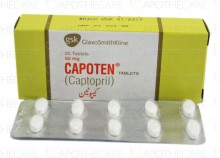Uses,side effect, contraindication of Captopril drug
What is captopril?
Captopril is an ACE inhibitor. ACE stands for angiotensin converting enzyme.
Captopril is used to treat
1.High blood pressure (hypertension),
1.High blood pressure (hypertension),
2.Congestive heart failure,
3.Kidney problems caused by diabetes, and to improve survival after a heart attack.
3.Kidney problems caused by diabetes, and to improve survival after a heart attack.
What captopril do?
Captopril works by blocking a substance in the body that causes blood vessels to tighten. As a result, the blood vessels relax. This lowers blood pressure and increases the supply of blood and oxygen to the heart.
Captopril is also used to help treat heart failure as mentioned above. It is also used in some patients after a heart attack. After a heart attack, some of the heart muscle is damaged and weakened. The heart muscle may continue to weaken as time goes by. This makes it more difficult for the heart to pump blood. Captopril may be started within the first few days after a hear
Important information
Do not use captopril if you are pregnant. If you become pregnant, stop taking this medicine and tell your doctor right away. Captopril can cause injury or death to the unborn baby if you take the medicine during your second or third trimester.
If you have diabetes, do not use captopril together with any medication that contains aliskiren (Amturnide, Tekturna, Tekamlo, Valturna).
Captopril side effects
Get emergency medical help if you have signs of an allergic reaction to captopril: hives; severe stomach pain; difficulty breathing; swelling of your face, lips, tongue, or throat.
See doctor if you you experience
A light-headed feeling, like you might pass out;
little or no urinating, or urinating more than usual;shortness of breath (even with mild exertion), swelling, rapid weight gain; chest pain or pressure, pounding heartbeats or fluttering in your chest; high potassium (slow heart rate, weak pulse, muscle weakness, tingly feeling); or
sudden weakness or ill feeling, fever, chills, sore throat, painful mouth sores, pain when swallowing, skin sores, cold or flu symptoms.
little or no urinating, or urinating more than usual;shortness of breath (even with mild exertion), swelling, rapid weight gain; chest pain or pressure, pounding heartbeats or fluttering in your chest; high potassium (slow heart rate, weak pulse, muscle weakness, tingly feeling); or
sudden weakness or ill feeling, fever, chills, sore throat, painful mouth sores, pain when swallowing, skin sores, cold or flu symptoms.
Common captopril side effects may include:
Cough;flushing (warmth, redness, or tingly feeling);
numbness, tingling, or burning pain in your hands or feet;
loss of taste sensation; or mild skin itching or rash.
numbness, tingling, or burning pain in your hands or feet;
loss of taste sensation; or mild skin itching or rash.
What should I avoid while taking captopril?
Drinking alcohol can further lower your blood pressure and may increase certain side effects of captopril.
Do not use salt substitutes or potassium supplements while taking captopril, unless your doctor has told you to.
Avoid becoming overheated or dehydrated during exercise and in hot weather. Follow your doctor's instructions about the type and amount of liquids you should drink. In some cases, drinking too much liquid can be as unsafe as not drinking enough.
Avoid strenuous exercise without your doctor's approval if you are being treated for heart failure.
Captopril dosage
Usual Adult Dose for Hypertension:
Initial dose: 25 mg orally 2 to 3 times a day one hour before meals
Maintenance dose: May increase every 1 to 2 weeks up to 50 mg orally three times a day. If blood pressure remains uncontrolled after 1 to 2 weeks at this dose, add a thiazide diuretic (loop diuretic if severe renal impairment exists) and titrate to its highest usual antihypertensive dose before further increases of captopril.
Maximum dose: 450 mg/day
Usual Adult Dose for Congestive Heart Failure:
Initial dose: 25 mg orally three times a day (6.25 to 12.5 mg orally three times a day if hypotensive, hyponatremic, or hypovolemic)
Target maintenance dose: 50 mg orally three times a day for at least two weeks to ensure a satisfactory response
Maximum dose: 450 mg/day
Comments:
-Most patients experience satisfactory clinical improvement at 50 or 100 mg orally three times a day.
-Should generally be used in conjunction with a diuretic and digitalis.
-Most patients experience satisfactory clinical improvement at 50 or 100 mg orally three times a day.
-Should generally be used in conjunction with a diuretic and digitalis.
Usual Adult Dose for Left Ventricular Dysfunction:
Initial dose: 6.25 mg orally once as early as three days post-myocardial infarction, followed by 12.5 mg orally three times a day; increase to 25 mg orally three times a day over the next several days, and then increase to target dose over the next several weeks as tolerated.
Target maintenance dose: 50 mg orally three times a day
Use: To improve survival following myocardial infarction in clinically stable patients with left ventricular dysfunction manifested as an ejection fraction of 40% or less and to reduce the incidence of overt heart failure and subsequent hospitalizations for congestive heart failure in these patients.
Usual Adult Dose for Diabetic Nephropathy:
25 mg orally three times a day
Comments: Other anti hypertensives may be used in conjunction with this drug if additional blood pressure reduction is required.
Use: Treatment of diabetic nephropathy (proteinuria greater than 500 mg/day) in patients with type I insulin-dependent diabetes mellitus and retinopathy.
Usual Adult Dose for Hypertensive Emergency:
25 mg orally 2 to 3 times a day; continue diuretic therapy and stop other anti hypertensives upon initiation of this drug; may increase dose every 24 hours or less until satisfactory blood pressure or maximum dose is reached.








"Wow, this post was like finding an extra fry at the bottom of the bag—unexpected but totally delightful! �🎉 Can’t wait to read more!" dark market list
ReplyDelete